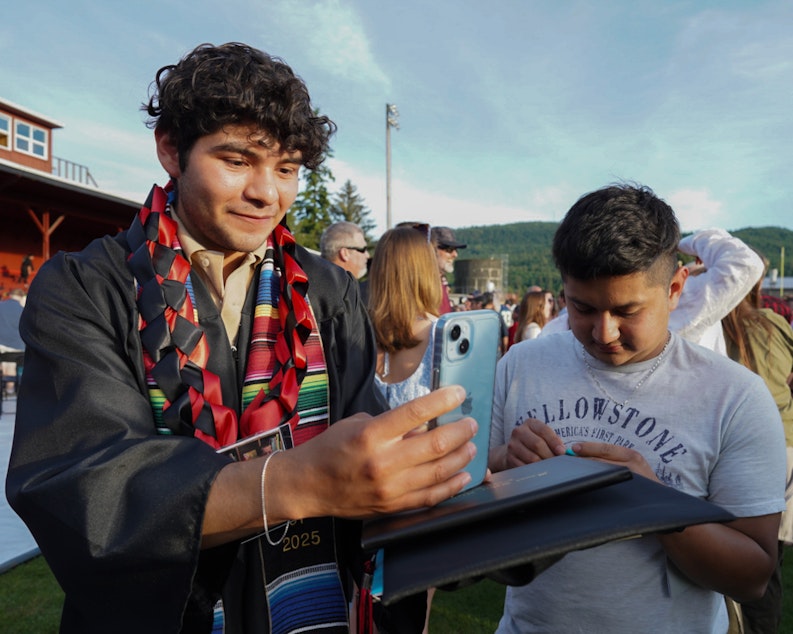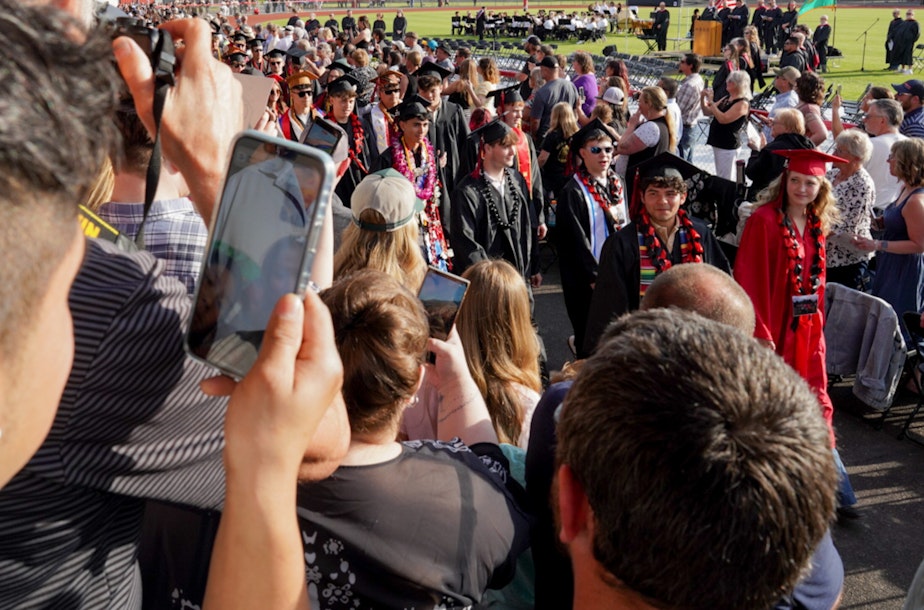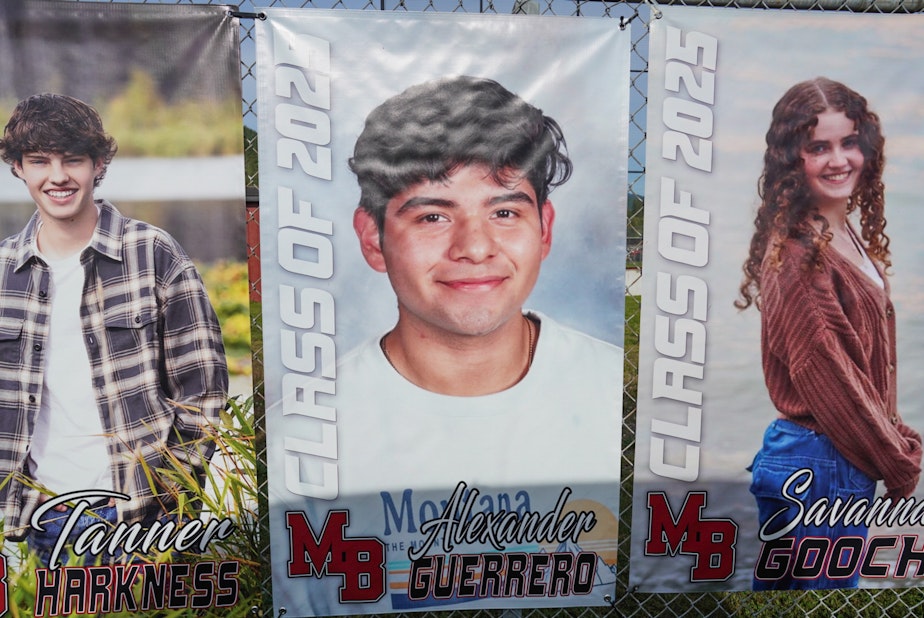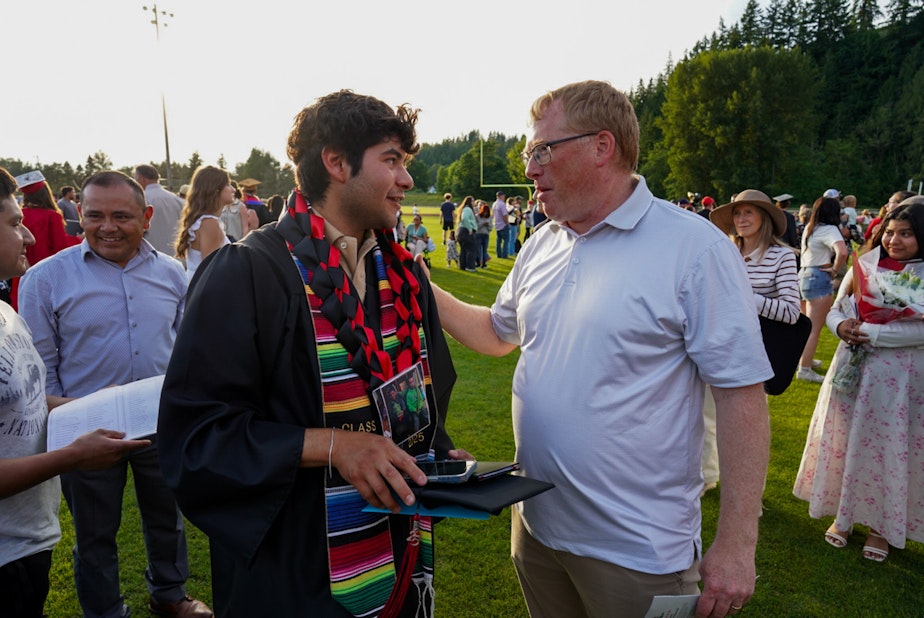ICE deportations leave empty seats at graduation ceremonies in Washington state

High school graduation was supposed to be a big family celebration for Alex Guerrero Villatoro.
The 18-year-old had marked off 15 feet of the bleachers for his family and friends at the Mount Baker High School football field in Deming, about 100 miles north of Seattle in Whatcom County.
But when the ceremony began last Thursday evening, only a few friends and only one close family member, Alex’s older brother, sat in the marked-off area. The rest of Guerrero Villatoro’s immediate family — his mom, dad, and three younger siblings — watched via live-streaming video nearly 3,000 miles away in Guatemala.
“They mean the whole world to me,” Guerrero Villatoro said. “I so wish they were present right now.”

In January, Guerrero Villatoro’s father, Armando Chaj, was detained by immigration agents outside a church near their home in Everson and deported back to his home country of Guatemala. After he was deported, Alex’s mom decided to self-deport to Guatemala with Alex’s three younger siblings.
RELATED: DHS vows immigration raids will continue as resistance mounts
According to the United Nations’ human rights office, 142,000 people were deported from the U.S. in President Donald Trump’s first three months in office. Many of those people left behind children and teenagers who are U.S. citizens. An estimated 200,000 homes in Washington state have at least one member who doesn’t have legal status. One in 10 K-12 students in the state have at least one parent who doesn’t have legal status in the U.S.
Many of the initial targets of the Trump administration’s mass deportation efforts have standing deportation orders. That was the case with Chaj.
When he was just 17 years old in 2004, he picked up a friend who had illegally crossed the border in Arizona. They were stopped by border agents. Chaj was released, but he spent the next 15 years fighting to get legal status in the U.S.
RELATED: Washington family torn apart after father arrested outside of church and deported
In 2019, his case was closed. He was supposed to leave the country, but he never did.
RELATED: Denounced by GOP lawmakers, blue state governors defend immigration policies
Guerrero Villatoro said the image of his father in handcuffs with three federal agents on him is something that is now etched in his mind. In the wake of his father's arrest and deportation, he dropped some classes and finished high school online so he could take a warehouse job. He sends a portion of his pay to his family to help them resettle in Guatemala. The rest is for him to save up and visit them.
Alex Guerrero Villatoro Church Audio Diary
Alex Guerrero Villatoro talks about the importance of church and faith in his life after his father was arrested by ICE and deported to Guatemala. His mother and three younger siblings self-deported to Guatemala to be with his father, leaving Alex and his older brother in the U.S.
Guerrero Villatoro said, even without most of his family there, his graduation was a great relief.
“It’s like I work every day and usually that gets me tired every day,” he said. “It’s what helps me go to sleep. But this feels like rest, like serenity, calmness, because it was a lot to get here.”
Sponsored

Guerrero Villatoro’s case is becoming more common as an increasing number of adults without legal status are deported. At least 40 families in Skagit and Whatcom counties have been separated by immigration enforcement in 2025. The majority of those separations are the result of a raid in April at Mt Baker Roofing Company in Bellingham that resulted in 37 arrests.
Advocates are worried about the lasting community and mental health impacts, especially for teenagers and children separated from their parents and adult relatives.

At the Mount Baker High School graduation, soccer coach Mike Barksdale was among the drifting crowd of church friends, teachers, and uncles who came to greet Guerrero Villatoro after the ceremony. Guerrero Villatoro would have been a captain this year, if he hadn’t had to start working after his parents’ departure. Barksdale said Guerrero Villatoro would talk with him about what he was going through.
Sponsored
“He was open with those things, which I think is good,” Barksdale said. “It shows his willingness to not only persevere on his own, but to have that community around him when he needed it.”
After the ceremony, Guerrero Villatoro was able to get back in touch with his family back in Guatemala via a phone video call. “It’s a special moment in the life of Alexander,” his father Armando Chaj said. “But the painful truth is we aren’t there and we feel that deeply.”
RELATED: ICE's novel strategy allows for more arrests from inside immigration courts
Alex isn’t entirely sure when he’s gonna see his parents in person again, but he’s going to make the effort to try soon, especially to see his younger siblings.
For most seniors, graduation night is a time to party. But Guerrero Villatoro planned a quiet dinner with his brother, so he could get to bed early and be ready for work in the morning.
Sponsored
He said despite everything he’s been through, graduation day was special.
“I didn’t think it’d be like this, but it feels amazing,” he said. “It genuinely feels amazing.”




